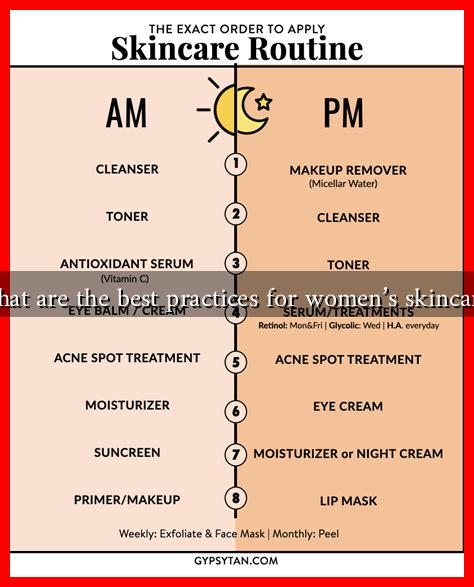-
Table of Contents
What are the Best Practices for Women’s Skincare?
Skincare is an essential aspect of personal care for women, not only for aesthetic reasons but also for maintaining overall skin health. With a plethora of products and advice available, it can be overwhelming to determine the best practices for effective skincare. This article outlines the best practices for women’s skincare, supported by research, expert opinions, and practical tips.
Understanding Your Skin Type
The first step in establishing a skincare routine is understanding your skin type. Skin can generally be categorized into five types: normal, oily, dry, combination, and sensitive. Each type requires different care and products.
- Normal Skin: Balanced moisture and oil levels, few imperfections.
- Oily Skin: Excess oil production, prone to acne and enlarged pores.
- Dry Skin: Lacks moisture, may feel tight or flaky.
- Combination Skin: A mix of oily and dry areas, often oily in the T-zone.
- Sensitive Skin: Prone to redness, irritation, and allergic reactions.
Identifying your skin type can help you choose the right products and treatments. For a detailed guide on skin types, you can refer to resources like the American Academy of Dermatology.
Establishing a Skincare Routine
A consistent skincare routine is crucial for maintaining healthy skin. Here are the essential steps to include:
- Cleansing: Use a gentle cleanser suitable for your skin type to remove dirt, oil, and makeup.
- Toning: Apply a toner to balance the skin’s pH and prepare it for further treatment.
- Moisturizing: Hydrate your skin with a moisturizer that suits your skin type, even if you have oily skin.
- Sun Protection: Apply a broad-spectrum sunscreen with at least SPF 30 daily, regardless of the weather.
According to a study published in the Journal of Clinical and Aesthetic Dermatology, consistent use of sunscreen can reduce the risk of skin cancer and prevent premature aging.
Incorporating Active Ingredients
Active ingredients can significantly enhance the effectiveness of your skincare routine. Here are some key ingredients to consider:
- Retinoids: Promote cell turnover and reduce signs of aging.
- Vitamin C: An antioxidant that brightens the skin and evens out skin tone.
- Hyaluronic Acid: A powerful humectant that retains moisture in the skin.
- Niacinamide: Helps to reduce inflammation and improve skin barrier function.
When introducing new active ingredients, it’s advisable to start slowly to avoid irritation. Consulting with a dermatologist can provide personalized recommendations based on your skin’s needs.
Adapting to Seasonal Changes
Skincare needs can change with the seasons. For instance, during winter, skin may become drier due to lower humidity levels. Here are some tips for seasonal skincare:
- Winter: Use thicker creams and consider adding a humidifier to your home.
- Summer: Opt for lightweight, oil-free products and increase sun protection.
Adapting your routine to the seasons can help maintain skin health and prevent issues like dryness or breakouts.
Healthy Lifestyle Choices
Skincare is not just about products; lifestyle choices play a significant role as well. Here are some healthy habits to incorporate:
- Hydration: Drink plenty of water to keep your skin hydrated from within.
- Nutrition: Consume a balanced diet rich in fruits, vegetables, and healthy fats.
- Sleep: Aim for 7-9 hours of quality sleep each night to allow your skin to repair itself.
- Stress Management: Practice stress-reducing techniques like yoga or meditation.
Research shows that stress can exacerbate skin conditions like acne and eczema, making stress management an essential part of skincare.
Conclusion
In conclusion, effective skincare for women involves understanding your skin type, establishing a consistent routine, incorporating active ingredients, adapting to seasonal changes, and making healthy lifestyle choices. By following these best practices, women can achieve and maintain healthy, radiant skin. Remember, skincare is a personal journey, and what works for one person may not work for another. Always consider consulting with a dermatologist for tailored advice and recommendations.
For more information on skincare routines and products, visit the American Academy of Dermatology.


